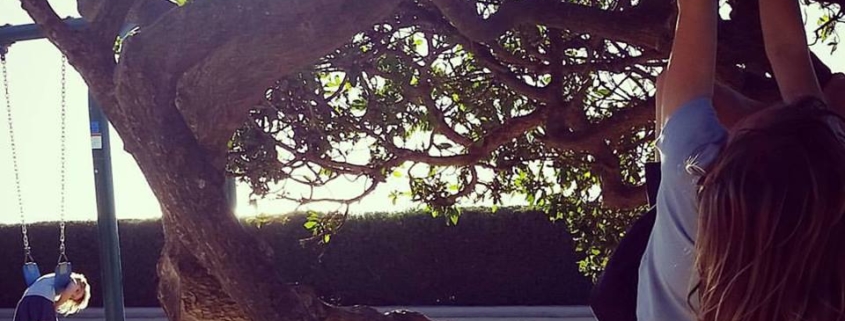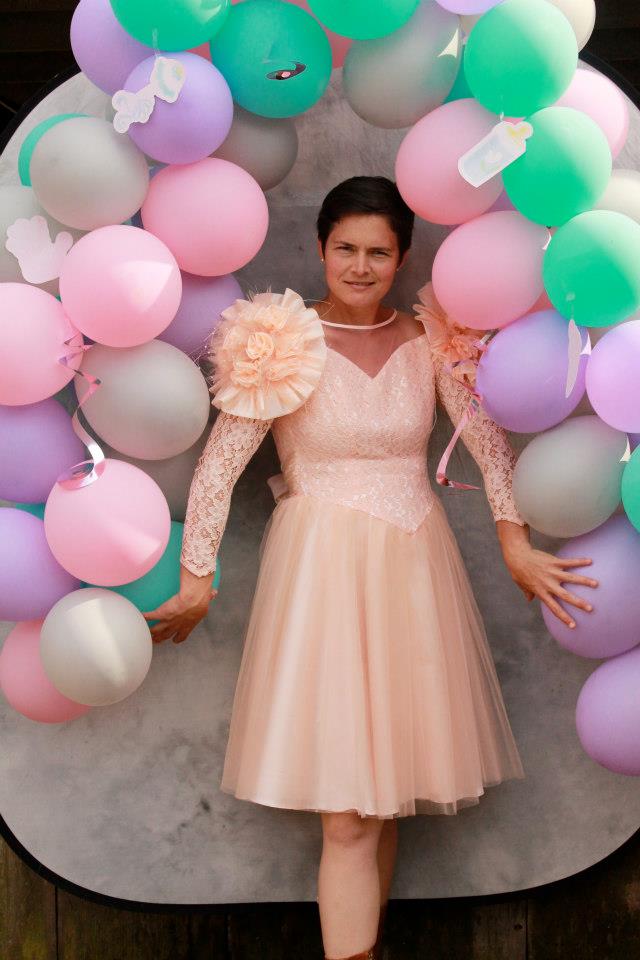Home Alone
In June, my husband took our daughters to Kansas City for two weeks. We thought it would be a good time for them to travel without me because I’d be at my MFA residency in Los Angeles and it’s hard to coordinate child care for the four and six-year-old in my absence. It’s hard to coordinate childcare even when I am home. I’m self-employed (nothing to do with writing) and I work out of our house. But the residency and my husband’s trip didn’t align very well, and in the end I was home alone for a long time. What happened to me was so little and so much.
I have been a mother for seven years. Motherhood is like you just get on the train and go. The children come into your bed and into the bathroom with you, if you’re not quick to lock the door. They get in your closet and dress up in your clothes. It feels sometimes like they want to crawl inside your skin. It doesn’t ever stop. And this was mostly okay with me, until I tried to be a writer, too.
There are parallels between the 1990 blockbuster Home Alone and my own recent experience with solitude. As a refresher, Kevin McCallister, ably, adorably played by Macaulay Culkin, is abandoned at home by his family in their rush to board a plane to France. My own family only went to the Midwest, and I was given ample notice, but the similarities are still striking. For one, Kevin and I both experienced distinct stages of loneliness. First there was disorientation, surprise at the foreignness of silence. This was followed by an unfettered glee spree. In Kevin’s case, that meant watching R-rated movies and eating ice-cream sundaes and sledding down the stairs. I settled for binge watching BBC crime dramas and drinking bourbon like a sad spinster minus the cats.
At the end of Home Alone (when he’s not setting fire to Joe Pesci’s head), Kevin gets sort of melancholy. He starts to miss his family. He goes to church by himself. In my parallel experience, after the thrill of freedom wore off, I became unsettled and afraid. I imagined I saw a ghost evaporating every time I turned on a light in a dark room. (I suspected my husband’s grandfather.) I tried to write but discovered that I’m conditioned to write while being distracted. The chaos of children is a now an integral wallpaper of my process.
My husband texted me pictures of the kids in Kansas and South Dakota. The kids eating hot dogs at a minor league baseball game. The two of them at an arcade, their faces lit by pinball bulbs, their fists full of tickets. In one picture they held turkey feathers—from actual turkeys—that they found on a nature walk; the striped plumes were as long as their little arms. In another picture they lay sleeping in the sand by a dock. There they were in a boat, their hair whipping wild. And there laughing, bobbing down the Missouri river in life jackets. I saw them bent over an astonishing quantity of ice-cream and hot fudge, their faces studious. And then blowing gigantic bubbles on a lawn—so big that their bodies could fit inside. They looked bright and happy and golden.
I went to eat sushi alone. A meal alone does not usually bother me, but when someone asked if I was using the empty chair across from me at the table, and I said no go ahead and they removed the chair, it felt like someone swept my legs out from under me. They had removed any illusion I had of not being alone. Till then, I might have been a person waiting. Maybe for her husband and kids. Or anyone.
In this stage, I called my kids on the phone every day. The older one just plain refused to talk. She was too busy having fun. The younger child obviously didn’t want to talk either, but she was gentle with me. On one call, after relaying her whereabouts and what fun she was having she said, “We can hang up now if you need to, Mom.” On another she pretended that we had a bad connection and that she could barely hear me. She actually used the words “bad connection.” She is four. “Okay,” I said. “Have a good time. Bye.”
 One night I watched a sad movie in my house and no one was around when I sobbed, which I actually prefer. I realized there was a loud drone of crickets or cicadas that was not coming from the movie. I muted the film. The noise from outside, the creatures clicking and zipping, turned on and off like a faucet. I wondered if this buzz had been buzzing every night and I had been too busy or preoccupied to hear it. I really wanted to know what they were, crickets or cicadas? Or something else? It had been hot all day but just then, alone in my chair with a face wet from crying, the air coming in the window brought the particular sweet relief of a summer night cooling off. It was indescribably pleasant. In the silence of the next morning I started to write and I wrote and wrote. And nobody asked me for a snack. Nobody crawled into my lap.
One night I watched a sad movie in my house and no one was around when I sobbed, which I actually prefer. I realized there was a loud drone of crickets or cicadas that was not coming from the movie. I muted the film. The noise from outside, the creatures clicking and zipping, turned on and off like a faucet. I wondered if this buzz had been buzzing every night and I had been too busy or preoccupied to hear it. I really wanted to know what they were, crickets or cicadas? Or something else? It had been hot all day but just then, alone in my chair with a face wet from crying, the air coming in the window brought the particular sweet relief of a summer night cooling off. It was indescribably pleasant. In the silence of the next morning I started to write and I wrote and wrote. And nobody asked me for a snack. Nobody crawled into my lap.
* * *
The August 2015 issue of Harper’s revolved around the theme of parenting. There was a Rivka Galchen piece that I can’t get off my mind. In Some Notes on Twentieth Century Writers, she listed successful women authors who were terrible mothers or had no children at all. The conceit seemed to be that those who became mothers sustained their success as artists by prioritizing art over child rearing, that thinking one can be both a good mother and a great writer is folly.
Not by design, but by coincidence, while my family was gone I read a book and an essay about abortion. The former was a French book in translation called Happening by Annie Ernaux where the narrator describes trying to get an abortion in 1960s France, at a time when it was illegal. The essay I read was by the American author Sallie Tisdale and was called “Fetus Dreams.” The regrettable title doesn’t reflect the quality of this excellent piece about the emotional conflict of working in an abortion clinic. Both stories were gruesome, graphic in recounting how a fetus is extracted from a woman’s womb. I read one of them while eating an enchilada covered in red sauce. My appetite progressively waned. But somewhere in the reading I started to think of my new solitude as a sort of very, very late term abortion. A second chance. While a woman’s right to choose is simple—inalienable and affirming of corporeal autonomy—the choice itself can be very complex indeed. It’s possible that, regardless of the decision, the consequence of the choice will always be some amount of regret.
Though the rights granted by Roe v Wade face constant threat of erosion, we live in a country where an abortion may yet be procured. But when I became pregnant, I chose to stay pregnant. What if I had not? I mean, I know I would have enjoyed more privacy in the bathroom, but would I have been a writer sooner? This sort of speculation feels like a transgression. I am superstitious and afraid even as I type it. I am very lucky to have healthy children. (I write this as a prayer.) But what am I doing writing if I don’t make space for uncomfortable questions?
I am biologically predisposed to want my girls to survive, to be happy even, but after about a week alone I started to think that the children were better off without me. Look at the adventure they’re having, I thought. If I were with them I would chase them with a bottle of sunscreen. All hot dogs would be soy dogs. I would limit their ice cream intake, even though summer should be all about ice cream. I thought about how, when they are home, they probably sense that I resent the compromise and conflict of my life. If they ask me to play when I’m trying to write, I send them to the back yard, suggesting that they “be resourceful.” Then, from my desk, I watch them out the window and hate myself. Sometimes, in a guilty panic, I catch them and kiss their faces and hug them quick and desperate, which is how I apologize for preferring writing over playing with them. Then I go back to my computer. I’m certain that if you are meant to be a writer and you don’t end up being a writer, that will kill you. But I also know that if you do write, the activity brings its own salvos, its endless mini-deaths. Trying to write and parent, too? It seems an annihilation. And a child may be unsafe in the care of a self-brutalizing artist.
In A Room of One’s Own, Virginia Woolf talks about great writing resulting only from the “incandescent mind.” She means a mind free of the bitterness, fear, hate, or protest caused by oppression and strife. About the unfulfilled potential of Bronte’s Jane Eyre, Woolf writes, “…but if one reads them over … one sees she will never get her genius expressed whole and entire. Her books will be deformed and twisted. She will write in a rage where she should write calmly.” Which is not to say that great art can’t be borne of suffering and opposition. But greater art may arise if strife is transcended. Motherhood itself can be oppressive: without choosing to, I love them more than I love myself and what art is in me. It is a love I cannot shake.
Kevin McCallister’s Home Alone experience culminates in a joyful reunion with his family. Of course they make it back by Christmas morning. Joe Pesci goes to jail. Everything is set aright and audiences are satisfied as the family is made whole. My own familial reunion was more muddled. There had been a discreet moment, just days before my husband and children returned, while reading a book in a sunny chair, uninterrupted for a couple hours, when I realized that I had fully readjusted to being alone. I was not looking forward to the time when my kids and my husband would return. I had no urge to call them. In fact I wished they’d never known me. I dreamed I could abort myself from their life. For two weeks I saw the alternate adventure, the one where I was no one’s mother. I was responsible only for my own survival and for being thoughtful about art. By the end, my fears had transformed: I was terrified not of ghosts but of my very real family, heading back to steal my solitude.
The day they came home I drove to the airport and parked. I walked to the baggage claim. My kids came down the escalator ahead of my husband, looking for me as they descended. When they spotted me they yelped and laughed and their faces were so beautiful that it hurt. They launched themselves from the bottom of the escalator and ran at my body, hitting it so hard I staggered back. They clung there and buried their faces in my pants. They smelled different, like different soap or a foreign place. I hugged them. I did not cry. We retrieved the bags and walked to the car. We drove home and everything went back to how it had been.
Mary Birnbaum is editor of Lunch Ticket’s Diana Woods Memorial Prize in Nonfiction. She holds an MFA from Antioch. She has contributed to Lunch Ticket and The Week. Mary was the 2018 recipient of Disquiet International’s Nonfiction Fellowship and a finalist for Chattahoochee Review’s Lamar York Prize. She resides in Vista, California with her daughters and husband. If you like, you can find her on Twitter @ailishbirnbaum






